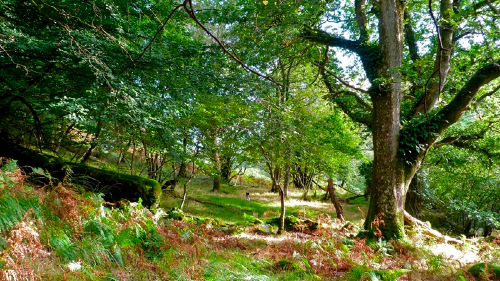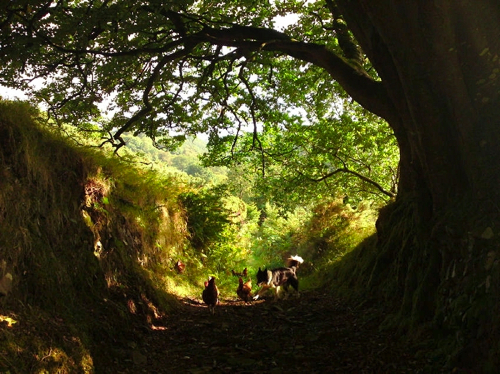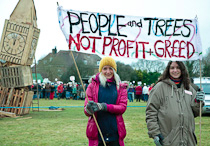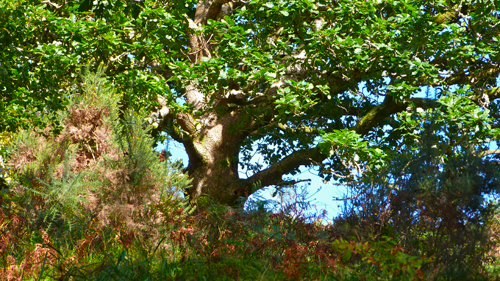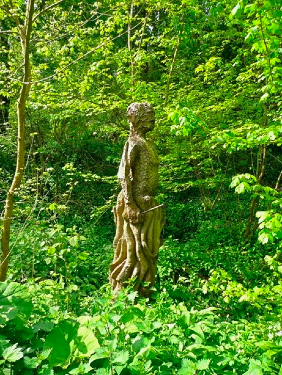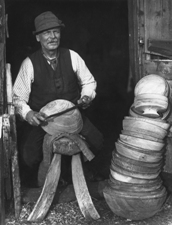by Alex Lockwood
As I sit down and begin to go through the government’s consultation documents on the proposed sale of England’s Public Forestry Estate, there is plenty of reason to be angry, indignant and frustrated with the idea that our forests will be privatized.
This anger isn’t, as the Coalition might think, because we don’t know the facts, or that it’s a kneejerk campaign against the idea of any form of privatization without understanding it. It’s because we simply don’t agree with the reification of economic arguments above the democratic, social, human and spiritual arguments for caring for our trees and our planet.
Woods are living things. So are we. Let us not risk the future of our living woods, or our future inheritance for wooded places, because the Coalition would rather cut hard, cut fast, or have a good think about Trident. Let’s keep David Cameron to his promise to be the ‘greenest government ever’.
This is the Big Society finding its voice, David, and it doesn’t like what you’re doing.
But there is also reason to be hopeful, resolute and even cheerful today – and that’s mainly because of the speed and size of this campaign so far, and the way it has quickly become a significant political issue for the coalition. And that it has galvanized 84% of the country who oppose this plan. It may—I believe will—get people outdoors more. And we know, or should know, the mental and physical benefits of a walk in the woods.
So, on the first day of this 12-week consultation, I wanted to give five reasons to cheer on what has been achieved so far; and then offer just five reasons why this is the beginning of our campaign.
5 reasons to CHEER
1. This campaign was always justified. On 24 Nov 2010 (and regardless of whatever Caroline Spelman says now as she retreats) Jim Paice announced that the Coalition government’s plan was to sell off ALL of the Public Forest Estate, including ancient woodland, into private hands (Original Announcement PDF)
2. Stopping Rupert Murdoch’s BSkyB bid got 40,000 signatures; getting George Obsorne to pay his taxes, 27,000; so far, the campaign to save our forests has achieved nearly 300,000… (well done, 38 Degrees)
3. The government has already lost the argument about the economic benefit, quicker and harder than could have been thought. The Forestry Commission costs each person each year less than a bag of crisps. So Caroline Spelman quickly changed strategy to talk about ‘regulation anomalies’ on Newsnight (BBC2, Wednesday 26th Jan). What will she try next?
4. Wow. Twitter and the hashtag. New friends, likeminded campaigners, a massive, massive movement bringing people together, engaging celebrities, leading the debate, not following it. And the media has followed us, and made it a major issue (although credit where due, the Telegraph reported on this in October, inflaming middle England. Pissing off the Telegraph’s readers: what were they thinking?!)
5. In 1992, John Major tried the same thing, and the Tories abandoned the plan following “a study by a group of senior civil servants and widespread public opposition” (The Telegraph). They were beaten then, and they will be beaten again.
5 reasons to KEEP IT GOING
And these are just five reasons to keep going, inspired by the detail of the documents released this morning for the consultation.
1. When the government decides to sell a woodland, it will notify organisations and the public on the date it goes live on the Forestry Commission website; the charities, NGOs and woodland organisations will then have JUST 28 DAYS to let the government know it wants preferred purchaser status and that it can justify the bid and pay an open market price (Selection Criteria for the Sale of Forestry Commission England Land PDF). But many of those organisations have already said they don’t have the money. Sorry, George and Dave, we’re not all millionaire Bullingdon Boys.
2. The government’s own Forestry Commission Equality Impact Assessment says not enough is yet known about the impact on the fire sale, and more work is needed to examine, among other things:
a. Impacts on public benefits (e.g. recreation, biodiversity, landscape, climate change mitigation/adaptation)
b. Impacts on the rural economy
(and many more. Check out the document for yourself.)
When I tell my students their assessments need more work, they go back and do more work. Why should our government do less?
3. In their consultation document, the government suggest we look at other countries’ experiences. Ok, so let’s do that. For example, the document mentions New Zealand, which sold much of its forests in the 1980s and 1990s. So what happened?
- the government now owns less than 7 percent of the planted forest area. New foreign players have entered the industry. The first round of forest sales in 1990-1991 saw the entry of Asian investors, who today account for just over 12 percent of the forest estate. After the second round of sales, United States investors now account for one third of the New Zealand forest estate
- The right of New Zealand’s indigenous people to claim land that is rightfully theirs is preserved in legislation. However, the process of advancing these rights has been slow to develop.
- The profitability and competitiveness of forestry have been positively influenced.
- Market fundamentals rather than policy prescriptions have seen investment in afforestation surge to new historical highs
- On-shore processing has been facilitated. However, the level of investment is a long way from the supply-determined potential. Whether it accords with the market potential is debatable.
Mary Clarke, FAO (United Nations)
Do we want our forests to be driven by market fundamentals? Do we want our rights protected in legislation, but not in practice? There is a lot more to learn from the experience of other countries—especially as, the consultation documents admit “Globally, the majority of forests are publicly owned” (Consultation Doc 2.5 – PDF)
4. The Consultation Document talks about a ‘community right to buy scheme’. The Right to Buy scheme for council housing has, of course, meant a shortfall in housing stock (because no-one replaced it, not the government and not the private sector; will this happen to forests? See the New Zealand example above) and it has left hundreds of thousands unable to get onto the housing ladder. For a wonderful analysis of how Right to Buy has sold out an entire generation, read Ed Howker’s and Shiv Malik’s book ‘Jilted Generation’
5. “The Government is committed to shifting the balance of power from Big Government to ‘big society’.” (Equality Impact Assessment Doc) But what does Big Government mean? What does ‘big society’ mean? Are they measurable? Do we all agree on that? ‘Big Society’ was the Tory manifesto call, but the Tories did not win a majority in the 2010 election.
Many Lib Dems in Scotland campaigned against just such a sell-off there (oh, look, a picture of Nick Clegg on the Scottish Save Our Forests website…). Which means, you would expect, they would stick to their principles… oh, no. They don’t do that anymore. But remember this. Without investment, leadership, and most importantly expertise (to manage forests; to commit time) a commitment from Big Government to ‘big society’ is rhetoric. Simply rhetoric.
Let’s keep going.
We strongly advise not rushing into responding to the consultation. We have 12 weeks to consider the issues more fully and to strip away the spin. Please take time to learn more about the Public Bodies Bill and the issues surrounding the proposed forest sales.













